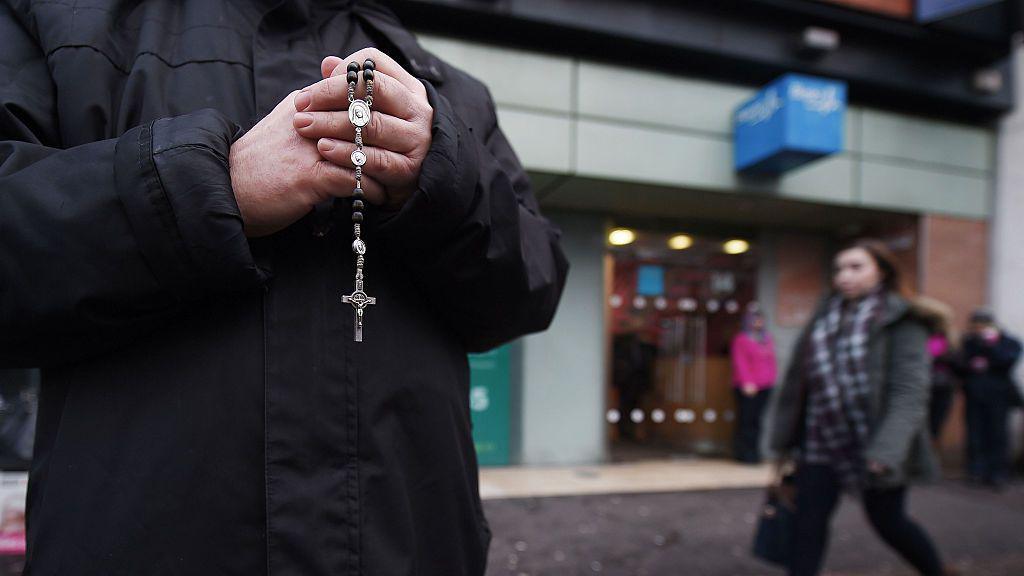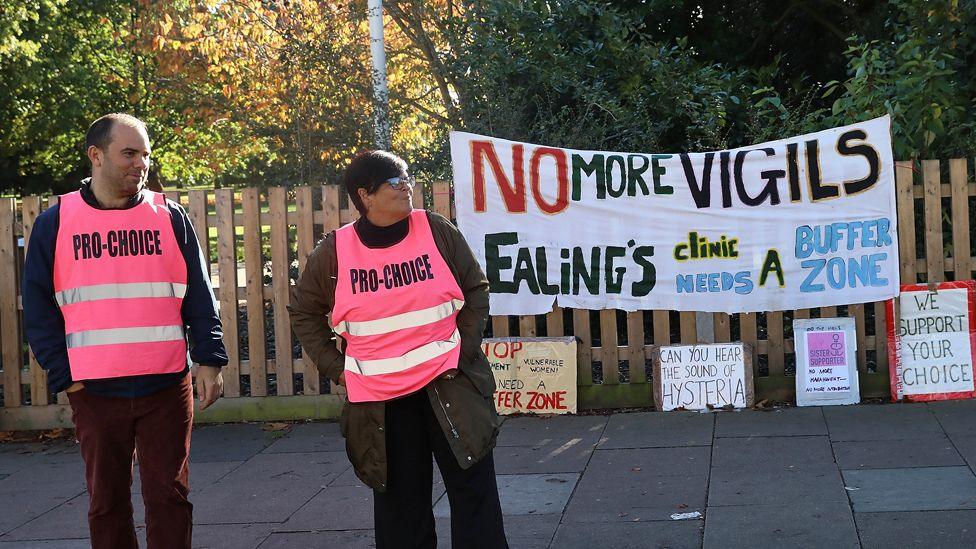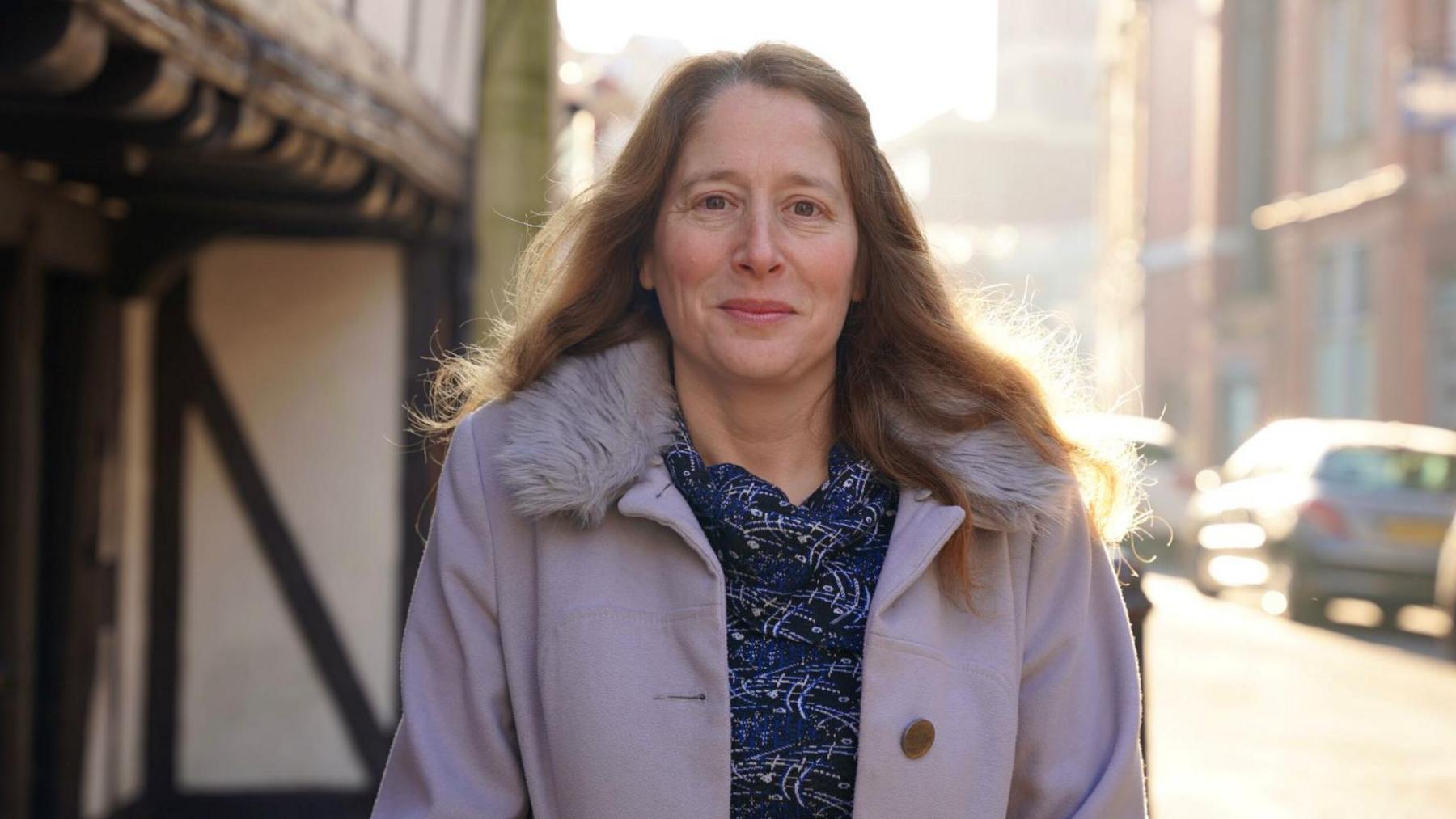Emma Barnett: I spent day at abortion clinic ahead of protest ban

Protesters often hold rosary beads and silently pray outside abortion clinics (file image)
- Published
When I arrive at an abortion clinic in south London, four protesters - three women and one man - are gathered on the opposite side of the road alongside a picture of the Virgin Mary, which is draped in rosary beads. They are silently mouthing prayers, and ask not to be interrupted.
Protesters outside abortion clinics, standing with signs - sometimes featuring graphic images of foetuses - have become a norm. This can be worrying and upsetting for some of the women going in for their procedure, who are sometimes approached by these individuals. The same is true for the healthcare staff working at the clinics.
On Thursday, a new law comes in making it illegal to “influence, harass or provoke” anyone using or administering pregnancy termination services within a 150m (492ft) radius of an abortion clinic in England and Wales.
The change follows similar bans implemented in Northern Ireland in 2023 and in Scotland in September.
Abortion buffer zones have long been campaigned for by some and fought against by others. Those who break this new law will face an unlimited fine.
The law aims to put in place stronger safeguards for women accessing this health service – especially at a time when the topic of abortion is aggressively debated globally. Critics, however, say this comes at the expense of freedom of speech.
There are always protesters outside the MSI Reproductive Choices abortion clinic in Brixton. It’s one I’ve walked past many times. When I arrive to report for BBC Radio 4’s Today programme, there are two men flanking the gates of the clinic holding rosary beads and carrying leaflets.
It seems a well-co-ordinated and a thought-out operation - even down to the fact that those praying know to immediately direct me to talk to the two men on the gate. So we cross the road and do just that.
Richard, who tells me he is here representing a Catholic charity which he says offers “the right sort of counselling to pregnant women”, has been coming to the centre for five weeks.
I ask him if there are any circumstances in which he believes abortion is acceptable, and he tells me no.
I challenge him on instances in which women have become pregnant as a result of rape. He says these abortions can lead to regret and that instead, “we need to weep with [the victim] and be empathetic”. Terminations can be traumatic, he tells me.
When I ask how he can know this as a man, he says there is research on the topic - though he doesn’t cite a specific paper. He says “you don’t need to be of a certain sex to know about the other sex”.
I ask both men whether they can understand how some women would find their presence intimidating, unkind and un-Christian - especially if they have had difficult experiences with men. That is not a view they can reconcile with their own conviction that they are trying to save lives.
Richard believes the perception that protesters like him are intimidating comes “from certain images, perhaps not from Britain” and says he and the others are not aggressive.
Listen: Emma Barnett challenges Richard, a Catholic campaigner outside an abortion clinic
In contrast to America and other countries, abortion in the UK is not a major political issue during general and local elections.
The numbers of abortions are going up. There were 251,377 abortions in England and Wales in 2022 - the highest number since the Abortion Act in 1967 was introduced, and an increase of 17% over the previous year.
Regular large opinion polls in this country show support has only grown for women’s right to access abortion. The National Centre For Social Research’s most recent social attitudes study shows support for abortion has increased, although support is slightly less universal when there is no health risk involved.
Three quarters of people surveyed in 2022 supported a woman’s right to have an abortion because she did not want to have a child, up from 37% in 1983. This figure rose to 89% when there was a strong chance of the baby having a serious health condition, and 95% when the woman’s health was seriously endangered by the pregnancy.
Seventy-two per cent believe abortion should be allowed when a couple cannot afford any more children, and 68% when the woman is not married and does not wish to marry.
Ailish McEntee, the midwife in charge of safeguarding adults and children at MSI Reproductive Choices, one of the UK’s largest abortion providers, welcomes the buffer zones. She says she has had to calm some women down who have been spoken to or accosted by protesters on their way in for an appointment.
“Women have had people screaming ‘murderer’ or shouting out ‘mummy’ and saying that they’re going to be praying for them and that is a really harrowing experience,” she tells me.
I challenge her about people’s right to free speech, protest and to be able to express their religious beliefs in this country. She acknowledges those rights are important but says the location of that expression also matters.
She tells me women shouldn’t have to deal with protest, dissent, shaming or argument on the way to receive healthcare, especially when some of the women have faced abuse by men - as that is her particular area of expertise and care.
Ailish’s account conflicts with Richard’s. She says she has seen protesters stop women and strongly try to prevent them from going in.
Both men I interviewed said they didn’t know what they would do from today when the law changes; whether they would continue to show up, but further away, or not come at all.
Time will tell. But as I left I saw a male member of the public take on one of the protesters, angrily telling them they shouldn’t be there. As of today - they might not be.
If you have been affected by any of the issues raised in this story, information and support is available via BBC Action Line.
Get in touch
If you would like to share your experiences, please get in touch.
Related topics
- Published18 September 2024

- Published21 August 2024
